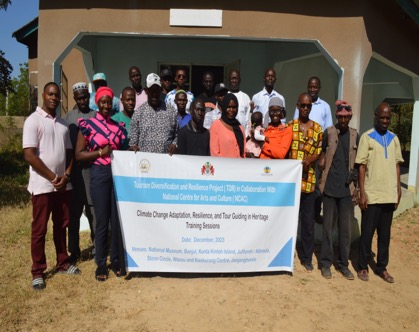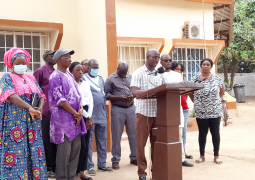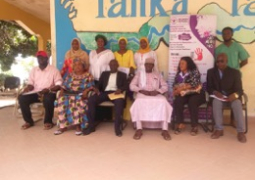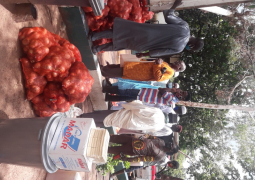
The refresher course, which targetted 20 participants from each heritage site, was held at McCarthy Island, Wassu, Juffureh and Banjul respectively.
The forum exposed participants to climate change adaptation, resilience, tour guiding in heritage sites and others.
Hassoum Ceesay, director General of the National Centre for Arts and Culture (NCAC), revealed that the Centre has benefited from the Tourism Diversification and Resilience Project (TDRP) of the World Bank grant through the Ministry of Tourism and Culture (MoTC) to train eighty site managers, tour guides and community managers together with community-based personnel on tour guiding, skills and climate changes, and also significance of heritage.
The first training of the project, he added, “centred on Kankurang Center and Museum, MacCarthy Island/Janjanbureh, and it is five-days training for each site which included Wassu, James Island, McCarthy and in Banjul.”
“The training course aims to refresh the knowledge of the concerned tour guides who are the interpreters of the heritage sites of The Gambia. So, we want to use this opportunity offered by the World Bank project to widen the horizon of our tour guides and also to build a better and more sustainable network between the NCAC, Ministry, GTBoard and the community hosting these heritage sites.” DG Ceesay indicated.
DG Ceesay underscored the role of the community in conservation and preservation of the heritage site, adding that this program is meant to prepare stakeholders on heritage management, conservation and preservation for better response to the needs of the local, international visitors and researchers, school children among others.
He however, lamented the devastating impact of climate change on heritage sites, noting that most of the heritage sites in The Gambia are at riverine areas such as Mungo Park Obelisk Memorial, Stones Circles, James Island, McCarthy and Banjul, too.
He thanked the Tourism Diversification and Resilience Project for this opportunity and also commended tour guides, the community leaders, personnel and all the participants that attended the training course including the resource persons.
Mamat Sallah, Deputy Director for Heritage Monument NCAC, expressed optimism that the training would help equip participants with the requisite knowledge on the conservation and particularly how climate change is impacting our environment.
The trainers included Messrs Mamat Sallah, Hassoum Ceesay, Alagie Bojang, Omar Ceesay, and Michael Campbell.




